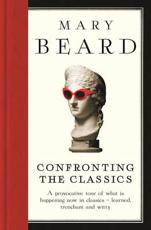Brief Note and New Books
[by Mark Safranski, a.k.a. “zen“]
Working on a number of things, top priority among which is a cross-post for Nuclear Diner about the Myhrvold Report that Cheryl Rofer decisively shredded here last week. Cheryl and I have done some point-counterpoint and blogging round tables together in the past but, this time I have been handicapped in my response by being largely in agreement 🙂 I will try to hit the report from a somewhat different angle but like Cheryl I have some serious reservations.
Picked up a few new reads this weekend that should be interesting to the readership:


Confronting the Classics by Mary Beard
Mary Beard is a British celebrity classicist from King’s College, an eminent figure in the field and extremely active in the social media realm where her blog, A Don’s Life and her twitter account are highly popular. She seems somewhat leftish anti-American in her politics, but does not appear to be under what Popper termed “the spell of Plato” and regards Socrates as a radical and subversive ( which he was, though not quite in the modern sense of those words). Here is a sample of Beard’s prose:
Marcus Tullius Cicero was murdered on 7 December 43 BC: Rome’s most famous orator, off-and-on defender of Republican liberty and thundering critic of autocracy. He was finally hunted down by lackeys of Mark Antony, a member of Rome’s ruling junta and principal victim of Cicero’s dazzling swansong of invective: more than a dozen speeches called the Philippics, after Demosthenes almost equally nasty attacks on Philip of Macedon, three centuries earlier.
Cicero of course shared the fate of Demosthenes, dying less ignobly than Pompey but much less impressively to his fellow Romans than did the fanatical Cato. As a result, Cato has an equally uncompromising libertarian think tank named in his honor while America’s gift to Cicero’s posterity is only a mafia-infested Chicago suburb.
Scahill is much better known figure than Beard. I frankly disagree in principle with his take on drones and al Qaida targets – unless they are hors d’ combat or attempting to surrender, as combatants *all* AQ members are legitimate military targets under the laws of war, period – but I wanted to see what his argument was at it’s most expansive and fully documented. Should be an interesting read.



September 30th, 2013 at 6:13 am
Hard to top pulling on your own intestines like yarn to disembowel yourself for fear of Caesar’s clemency. As Addison wrote, “What a pity it is/That we can die but once to serve our country”
September 30th, 2013 at 3:34 pm
Mark-
.
Another book for your antilibrary:
.
Command Culture: Officer Education in the US Army and German Armed Forces, 1901-1940, and the Consequences for World War II, by Joerg Muth\
.
I just finished it, and found it refreshing how much he demolished the mystical nature of the service academies and the ticket-punching that apparently occurred at CGSC several decades ago. He also spoke of how well the German commissioning systems and PME apparatus seemed to build excellent tactical leadership, but failed at the grand-strategic level.
.
Americans tend to like Prussian military things, and therefore immitate Prussian military things–but we tend to do it badly.
.
He also speaks to the culture of the service academies and the Kriegschulen, as well as the pedagogy and didactics of the American and German systems. I figure you might be interested in that, too.
.
I hope you give it a read.
.
S/F,
Nate
September 30th, 2013 at 5:12 pm
Hi Lynn,
.
Cato knew how to make an exit.
.
Hi Nate,
.
Just googled it and I am adding Muth to my list of books to buy. Looks very good, I agree.
.
The Germans did fail at the grand strategic level. Sometimes this is obscured by the personalist nature of Hitler’s tyranny where he was not only Fuhrer and supreme commander of the Wehrrmacht, but also his own minister of War and at a later point – Army commander-in-chief – making Hitler his own subordinate three times over.
.
http://www.history.com/this-day-in-history/hitler-takes-command-of-the-german-army
.
However it is hard to argue that the German grand strategy was much better in WWI or that the General Staff of Prussia would have not have similarly courted disaster in 1870 or in the Austro-Prussian war had Bismarck not served as a powerful counterweight to obliviously pursuing operational logic without regard to geopolitical strategy.
.
BTW a deceased professor of mine had a riff on how the Russians under the Tsars damaged their military power with imported Prussophiliac “paradomania” and fascination with the superficial elements of Frederick the Great’s military system while ignoring the strategic substance